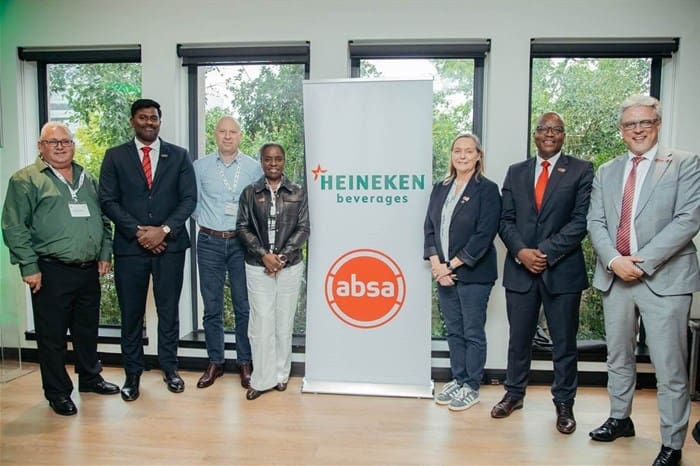In a bid to address growing financial pressures on South Africa’s small and medium-sized enterprises (SMEs), Absa and Heineken Beverages announced a R1.2 billion funding initiative to support black-owned businesses.
Announced this week, the initiative forms part of Heineken’s Ukukhula Fund, a multi-year programme designed to strengthen supplier development, support market access, and localise Heineken’s South African value chain. The fund is financed equally by Absa and Heineken.
According to the companies, the fund includes R600 million in Enterprise and Supplier Development (ESD) capital from Heineken, administered by Absa, and an additional R600 million in co-lending provided directly by Absa. The combined R1.2bn is expected to support more than 100 black-owned SMEs across the beverages sector and adjacent industries. Particularly those that have historically struggled to secure capital from traditional financing channels.
The initiative goes beyond capital injection, incorporating non-financial support to ensure long-term success. Participating SMEs will benefit from business development services, financial literacy and governance training. Market integration also be offered through Absa’s ESD networks.
Absa’s interim Managing Executive for SME Business, Vignesh Subramani, said SMEs remain central to South Africa’s economic prospects.
“Small businesses are the heartbeat of our economy,” he said.
“This initiative goes beyond funding. It is about creating an ecosystem of support that enables black-owned SMEs to scale and compete sustainably.”
The initiative arrives as South Africa’s SME landscape faces mounting pressure. SMEs contribute roughly a third of national GDP and over 60% of employment. In 2025 alone, more than 620 SMEs shit down according to industry reports. Court-enforced liquidations have also surged. Rising costs, limited cash flow, and funding gaps are among the main reasons.
Industry organisations such as South African Breweries Industry Association (SABIA) and Business Unity South Africa (BUSA) have repeatedly highlighted these challenges. They have called for private-sector interventions to prevent further closures.
“This fund is about shifting the system, not just writing cheques, but by embedding governance, transparency, and measurable outcomes into every layer of the solution,” said Stephen Seaka, Managing Executive for Public Sector and Growth Capital Solutions at Absa CIB.
“Through this funding deal with Heineken , we are enabling scalable social impact and driving supply-chain access, localisation and financial inclusion.”
The fund forms part of Heineken’s broader Ukukhula Fund, structured to support black-owned businesses through two key streams. The Supplier Development Fund, which allocates R400 million to historically disadvantaged suppliers, including black women-owned enterprises. The Growth & Localisation Fund, contributes R200 million to strengthen local enterprises, reduces reliance on imports, and fosters more resilient supply chains.
ABSA additionally contributes R1.5 million annually to support Heineken’s business development initiatives. It also provides R100,000 per year for financial education programmes targeted at emerging entrepreneurs.
Heineken Beverages Managing Director Richard Kuppers said the partnership forms part of the company’s long-term localisation and transformation strategy.
“This is about building a resilient supplier base that reflects South Africa’s economic reality. We want to ensure that more black-owned businesses are active participants in our value chain, strong, competitive and scalable,” said Kuppers.
With SME liquidations on the rise and economic activity slowing, analysts say the partnership signals an important shift in how the private sector approaches SME development by combining funding with structured support to improve success and survival rates.
Analysts say the R1.2 billion initiative is a significant private-sector intervention. It combines funding with structure, and also seeks to stimulate job creation and foster inclusive growth.
Azwi@vutivibusiness.co.za































































